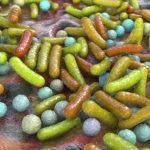By Bonnie Jenkins, Advanced Natural Wellness
It’s been a long, cold winter – and it isn’t over yet. That means more colds and flu. Fortunately, legions of immune cells patrol your bloodstream day and night, destroying harmful bacteria, viruses, and other invaders to stop trouble before it can start.
But as you age, your immune system doesn’t work as effectively as it once did, so you may get sick more often and take longer to heal. Fortunately, you don’t need to succumb to weakened immunity. I’ve targeted some easy ways to kick start your immune system, no matter how the years have undermined your health.
Immunity Deconstructed
The immune system is an exquisitely intricate network made up of cells, antibodies, and proteins. Constantly active, the system coordinates activities to protect the body from potentially harmful microorganisms like bacteria, viruses, fungi, and parasites. Moreover, it’s not just infection you’re protecting against, but also chronic conditions like heart disease, cancer, and arthritis, which can be triggered by these invaders.
Unfortunately, simply getting older impairs your ability to fight off infection. Years of wear and tear on the ever-vigilant immune sentry eventually take their toll. As this complex system starts to slow down, invaders take advantage of lapses in the armor to multiply and overwhelm the body’s defenses, making you more susceptible to disease with each passing year. Of course, other factors can compromise the immune system, like being malnourished, not getting enough sleep, being sedentary, or having a chronic disease like cancer. Other setbacks include major surgery or physical trauma like severe burns or broken bones.
The good news is that healthy living is the best strategy for top-flight immunity. Nutrient-rich foods and regular exercise help insure the integrity of germ barriers – particularly the skin – and help cultivate your immune system’s many components. But there is more you can do to stay healthy as you age.
MD Exposes the Hidden Danger to Your Eyes

When your eyesight starts to fail, it's a real problem. Suddenly you can't go to the grocery store... you can't get to the doctor if you have an emergency... you can't meet your friends for dinner…
Your "regular" doctor doesn't have time to keep up with the latest research. And the same goes for eye doctors. They go to school to learn how to fit you for glasses and contacts, but have no way of preventing the damage and loss of eyesight that threatens your freedom and independence.
Let me show you something that explains a LOT about how your eyes work.
In my FREE Special Report, I'll show you a HUGE, untapped resource for your eyes that safely and naturally restores clear, effortless eyesight.
Click here to get started...
Mind Your Minerals
The thymus gland is responsible for converting ordinary white blood cells into special cells that can recognize and destroy invaders. But the thymus shrinks as we age. Getting enough zinc every day can help counteract an aging thymus – and it doesn’t take much. In fact, all you need is 15 mg. of supplemental zinc daily. Just be aware that zinc supplementation inhibits copper absorption, which can eventually result in anemia. If you take zinc on a regular basis, be sure to also take 2 mg. of supplemental copper daily to prevent a deficiency.
Selenium is another trace mineral that plays an important roll in immunity. In a small study by British researchers, people with low levels of this mineral were given either 50 mcg. of selenium, 100 mcg of selenium, or a placebo for 15 weeks. Six weeks into the trial, each subject was given an oral vaccine containing live attenuated poliomyelitis virus. By measuring how the body’s immune cells reacted to the virus, the researchers found that the immune response was significantly boosted in those who received the selenium supplements, compared to the placebo group. Plus, the participants who took the selenium cleared the virus from their bodies faster than the placebo subjects.
Selenium works in another way to protect immunity. It also boosts the antioxidant power of vitamin E. So how much should you take? Most health practitioners recommend taking between 100 and 200 mcg. of selenium daily. Just don’t overdo it. The National Academy of Sciences recommends that selenium intake not exceed 400 mcg. per day, unless the higher intake is monitored by a healthcare professional.
Beneficial Bugs
There’s a shoving match going on all the time in your gut between “good” and “bad” bacteria. In healthy people, good bacteria maintains the upper hand. But antibiotics, illness, stress, poor diet, and just getting older can give bad bugs a leg up.
Enter probiotics, the beneficial bacteria found in cultured dairy foods like yogurt. Probiotics may boost your immune system to guard against gastrointestinal infections and may even suppress certain cancers.
Are You Suffering From...
- Love handles and a pot belly
- Romance that isn't what it used to
- Forgetfulness and inattention
- Low (or no) strength and endurance
- A sex drive that's shifted into neutral...or worse
If so...you may have Mature Male Burnout. Click here to discover more about this unique condition and what you can do about it.
How do these friendly bugs promote immunity? They seem to work in two ways: first, by creating a hostile environment for their nasty counterparts. Second, they crowd out the germs that can make you sick. Gut-friendly bacteria also act as a physical barrier by blocking the passage of harmful bacteria from foods into the bloodstream.
A steady supply of probiotics offers the best results. Look for L. acidophilus, Bifidus, and Lactobacillus in yogurt, acidophilus milk, and kefir (a fermented dairy drink). But it’s also smart to take a probiotic supplement that contains at least six different live active cultures.
One Last Thing …
If you want to preserve your immune function, don’t diet unless you’re sure you can keep the weight off. According to researchers at the Fred Hutchinson Cancer Research Center in Seattle, losing 10 pounds or more only to regain it all may lower your resistance to germs.
It seems that the more often your weight goes up and down, the less active potent infection fighters – called natural killer (NK) cells – become. NK cells identify and destroy harmful germs by halting the replication of cells in the body the germs have infiltrated.
If you’re overweight, forget yo-yo and crash dieting. Commit to losing the weight for good – and take your time doing it. Eat at least 1,200 calories a day and set a goal of losing one to two pounds a week. It might take a while, but studies show that slow and steady is the perfect recipe for permanent weight loss.
Research Brief …
I thought I was pretty well nourished. After all, I make sure to eat plenty of fruits and vegetables along with whole grains and healthy fats. But even my healthful habits couldn’t protect me from anemia after a recent surgery. The solution? Supplemental iron.
Iron is an essential nutrient that carries oxygen in the blood and is an integral part of the proteins and enzymes involved in metabolism. A deficiency of iron limits oxygen delivery to cells, resulting in symptoms that range from fatigue to impaired immunity. But, here’s a surprise – iron-deficiency anemia is more typically a problem for children, vegetarians, and women in their childbearing years. Men and postmenopausal women actually face a greater risk of too much iron.
This news might be surprising, especially if you remember the old Geritol ads that promised its iron-rich formula would give you more energy. But experts now question the wisdom of supplemental iron because of concerns over the commonly inherited condition called hemochromatosis in which the body stores too much iron. It affects about one of every 250 people, though it’s more common in men.
How much harm can it do? A lot. If undetected – as it often is – iron builds up over time and damages organs like the heart and liver. It’s also implicated in arthritis, diabetes, and impotence. Doctors may not realize that iron is the root cause of all these problems. But if detected, it can be treated by donating blood regularly plus avoiding iron supplements and iron-fortified foods.
A blood test is the only way to know what your iron status is. A routine battery of tests typically includes hematocrit and hemoglobin, but not transferrin saturation and serum ferritin, which are necessary for an accurate picture. So the next time you’re having blood work done, ask your doctor to include a transferrin saturation and a serum ferritin test. Meanwhile, check your multivitamin for iron. If you’re over 50, make sure you aren’t taking supplemental iron – even in your multi – unless directed by your doctor.
References:
Hoffmann PR, Berry MJ. “The influence of selenium on immune responses.” Molecular Nutrition and Food Research. 2008;52:1273-1280.
Klipstein-Grobusch K, Koster JF, Grobbee DE, et al. “Serum ferritin and risk of myocardial infarction in the elderly: the Rotterdam Study.” American Journal of Clinical Nutrition. 1999;69:1231–1236.
Meydani SN, Barnett JB, Dallal GE, et al. “Serum zinc and pneumonia in nursing home elderly.” American Journal of Clinical Nutrition. 2007;86:1167-1173.
Stevens RG, Graubard BI, Micozzi MS, et al. “Moderate elevation of body iron level and increased risk of cancer occurrence and death.” International Journal of Cancer. 1994;56:364–369






